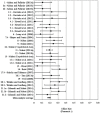The relationship between nature connectedness and happiness: a meta-analysis - PubMed (original) (raw)
The relationship between nature connectedness and happiness: a meta-analysis
Colin A Capaldi et al. Front Psychol. 2014.
Abstract
Research suggests that contact with nature can be beneficial, for example leading to improvements in mood, cognition, and health. A distinct but related idea is the personality construct of subjective nature connectedness, a stable individual difference in cognitive, affective, and experiential connection with the natural environment. Subjective nature connectedness is a strong predictor of pro-environmental attitudes and behaviors that may also be positively associated with subjective well-being. This meta-analysis was conducted to examine the relationship between nature connectedness and happiness. Based on 30 samples (n = 8523), a fixed-effect meta-analysis found a small but significant effect size (r = 0.19). Those who are more connected to nature tended to experience more positive affect, vitality, and life satisfaction compared to those less connected to nature. Publication status, year, average age, and percentage of females in the sample were not significant moderators. Vitality had the strongest relationship with nature connectedness (r = 0.24), followed by positive affect (r = 0.22) and life satisfaction (r = 0.17). In terms of specific nature connectedness measures, associations were the strongest between happiness and inclusion of nature in self (r = 0.27), compared to nature relatedness (r = 0.18) and connectedness to nature (r = 0.18). This research highlights the importance of considering personality when examining the psychological benefits of nature. The results suggest that closer human-nature relationships do not have to come at the expense of happiness. Rather, this meta-analysis shows that being connected to nature and feeling happy are, in fact, connected.
Keywords: biophilia; connectedness to nature; happiness; hedonic well-being; human-nature relationship; meta-analysis; nature relatedness; subjective well-being.
Figures
Figure 1
Forest plot.
Similar articles
- Connectedness to Nature: Its Impact on Sustainable Behaviors and Happiness in Children.
Barrera-Hernández LF, Sotelo-Castillo MA, Echeverría-Castro SB, Tapia-Fonllem CO. Barrera-Hernández LF, et al. Front Psychol. 2020 Feb 26;11:276. doi: 10.3389/fpsyg.2020.00276. eCollection 2020. Front Psychol. 2020. PMID: 32174866 Free PMC article. - 30 Days Wild and the Relationships Between Engagement With Nature's Beauty, Nature Connectedness and Well-Being.
Richardson M, McEwan K. Richardson M, et al. Front Psychol. 2018 Sep 3;9:1500. doi: 10.3389/fpsyg.2018.01500. eCollection 2018. Front Psychol. 2018. PMID: 30233443 Free PMC article. - The NR-6: a new brief measure of nature relatedness.
Nisbet EK, Zelenski JM. Nisbet EK, et al. Front Psychol. 2013 Nov 1;4:813. doi: 10.3389/fpsyg.2013.00813. eCollection 2013. Front Psychol. 2013. PMID: 24198806 Free PMC article. - Understanding and promoting nature connectedness: A human ecological perspective.
Christens BD, McCormick ML, Wolf J. Christens BD, et al. Curr Opin Psychol. 2025 Apr 26;65:102046. doi: 10.1016/j.copsyc.2025.102046. Online ahead of print. Curr Opin Psychol. 2025. PMID: 40334530 Review. - Relationships between people and nature: Nature connectedness and relational environmental values.
Lengieza ML, Aviste R. Lengieza ML, et al. Curr Opin Psychol. 2025 Apr;62:101984. doi: 10.1016/j.copsyc.2024.101984. Epub 2024 Dec 24. Curr Opin Psychol. 2025. PMID: 39765177 Review.
Cited by
- How Do Nature-Based Activities Benefit Essential Workers during the COVID-19 Pandemic? The Mediating Effect of Nature Connectedness.
Huang X, Luo L, Li X, Lin Y, Chen Z, Jin C. Huang X, et al. Int J Environ Res Public Health. 2022 Dec 8;19(24):16501. doi: 10.3390/ijerph192416501. Int J Environ Res Public Health. 2022. PMID: 36554383 Free PMC article. - An Exploration of How Biophilic Attributes on Campuses Might Support Student Connectedness to Nature, Others, and Self.
Alves S, Betrabet Gulwadi G, Nilsson P. Alves S, et al. Front Psychol. 2022 Apr 13;12:793175. doi: 10.3389/fpsyg.2021.793175. eCollection 2021. Front Psychol. 2022. PMID: 35498153 Free PMC article. Review. - The influence of firm's feedbacks on user-generated content's linguistic style matching-An explanation based on communication accommodation theory.
Liu D, Gong C, Zhang S, Ma Y. Liu D, et al. Front Psychol. 2022 Jul 22;13:949968. doi: 10.3389/fpsyg.2022.949968. eCollection 2022. Front Psychol. 2022. PMID: 35936319 Free PMC article. - Psychosocial and Biological Outcomes of Immersive, Mindfulness-Based Treks in Nature for Groups of Young Adults and Caregivers Affected by Cancer: Results from a Single Arm Program Evaluation from 2016-2021.
Victorson D, Doninger G, Victorson S, Victorson G, Hall L, Maletich C, Corr BR, Scortino K, Burns Z, Allen L, Rosa I, Quirk K, Adegbemi A, Strokoff J, Zuidema K, Sajdak K, Mckibben T, Roberts A, McDade TW, Boes A, McAlinden K, Arredondo K, Sauer C, Smith K, Salsman JM. Victorson D, et al. Int J Environ Res Public Health. 2021 Nov 30;18(23):12622. doi: 10.3390/ijerph182312622. Int J Environ Res Public Health. 2021. PMID: 34886348 Free PMC article. - The effect of brief exposure to virtual nature on mental wellbeing in adolescents.
Owens M, Bunce H. Owens M, et al. Sci Rep. 2023 Oct 18;13(1):17769. doi: 10.1038/s41598-023-44717-z. Sci Rep. 2023. PMID: 37853074 Free PMC article. Clinical Trial.
References
- *. Aitken N., Pelletier L. G. (2013a). The benefits of being connected to nature and motivated toward the environment on subjective well-being, in Presented at the 74th Annual Canadian Psychological Association Convention, Quebec City, QC
- *. Aitken N., Pelletier L. G. (2013b). Differentiating Habits for pro-environmental transportation behaviour, in Presented at the 10th Biennial Conference on Environmental Psychology, Magdeburg, Germany
- Ajzen I., Driver B. L. (1992). Application of the theory of planned behavior to leisure choice. J. Leisure Res. 24, 207–224
- Aron A., Aron E. N., Smollan D. (1992). Inclusion of other in the self scale and the structure of interpersonal closeness. J. Pers. Soc. Psychol. 63, 596–612 10.1037/0022-3514.63.4.596 - DOI
LinkOut - more resources
Full Text Sources
Other Literature Sources
